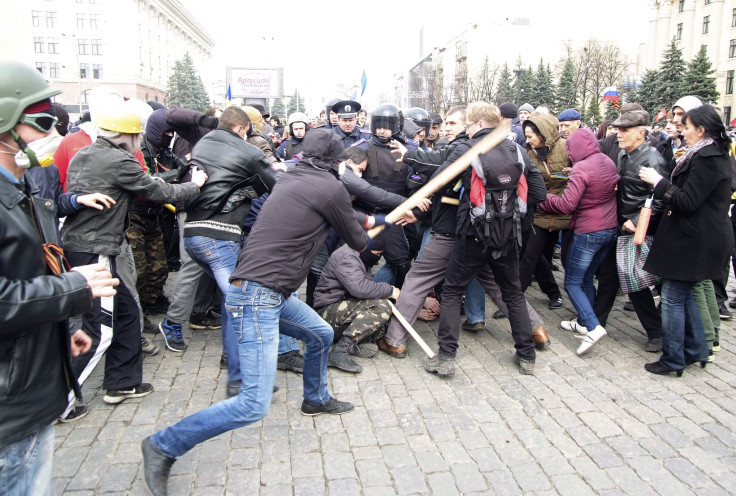Pointing Fingers: Eastern And Western Officials Place Blame On Each Other For Rising Tensions In Eastern Ukraine

Unrest in eastern Ukraine over the weekend has re-escalated tensions between authorities in the East and West.
Tensions have broken out into violence in the eastern cities of Donetsk, Kharkiv and Luhansk. A majority of people in the eastern regions of Ukraine feel a strong connection with Russia, and protesters are a calling for a referendum to leave Ukraine and join Russia, much like what happened in Crimea recently.
Pro-Russian separatists and Ukrainian police were struggling for control of the regional government building in Donetsk Monday. Donetsk has been the center of tensions between the factions for the last week. CNN reports that Ukrainian special forces retook the main government building in Donetsk Monday night.
Over the weekend, protesters broke through police lines to raise the Russian flag on the building and declare Donetsk’s independence from Ukraine. They also called on Russian President Vladimir Putin to send in troops to support their independence.
In Kharkiv, tensions rose as pro-West supporters from Kiev went to the city to support their new government. Pro-Russian activists in that city stormed public buildings on Sunday and on Monday they accidentally stormed the city’s opera house, which they mistook for the mayor's office. A union of coal miners also said they would not support any measure that would divide Ukraine.
Russian Foreign Minister Sergei Lavrov wrote an op-ed in The Guardian titled “It’s not Russia that is destablising Ukraine,” in which he argues the EU, U.S. and NATO are the actors behind the unrest in Ukraine. He says the West is blocking Russian attempts to set up negotiations. He claims, “Russia is doing all it can to promote early stabilization in Ukraine,” and that “it is time to stop the groundless whipping-up of tension, and to return to serious common work.”
Lavrov also phoned his Ukrainian counterpart to tell him Kiev must not use force against pro-Russian protesters in the highly volatile southeast region of Ukraine. Ukraine’s Interior Ministry meanwhile has again reasserted Kiev’s position that Putin is behind violence situation in eastern Ukraine.
Lavrov spoke with U.S. Secretary of State John Kerry Monday as well. State Department spokeswoman Jen Psaki said Kerry “called on Russia to publicly disavow the activities of separatists, saboteurs and provocateurs,” and added that Kerry believes the unrest does not appear to be a “spontaneous set of events.”
White House spokesman Jay Carney echoed that sentiment as well, saying, “There is strong evidence suggesting some of these demonstrators were paid.”
The BBC reports they discussed the possibility of holding direct talks in the next 10 days.
© Copyright IBTimes 2025. All rights reserved.






















